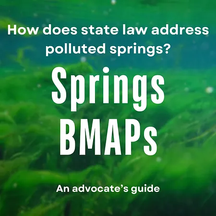
SPRINGS BMAPs
Basin Management Action Plans
DEP "plans to fail"
- unless springs advocates keep the pressure on.
Springs BMAPs were mandated by the legislature in response to declining springs health.
DEP is required to update Springs BMAPs - plans to restore polluted springs - by July 2025.
These water quality plans are the only regulatory tool we have to clean polluted springs, so
it's essential for springs advocates to be involved and keep the pressure on DEP.
On June 20, FSC hosted a live discussion to unpack the updates DEP has provided for the new Springs BMAPs due in 2025.
We cover the history of the Springs BMAPs, the biggest polluters for each basin, the difference in pollution levels since the previous BMAPs were adopted, and how the Springs BMAPs have performed.
Watch the replay here, and see our overall takeaways about DEP's updates below, and keep scrolling for spring-by-spring information.
Springs BMAP updates:
3 Key takeaways for springs statewide

Agriculture remains the dominant source of pollution to Florida’s springs, followed by septic tanks.
Dairies, livestock, and farm fertilizer, all in shades of green here, account for 52.8% of nitrate pollution in springs statewide.
*OSTDS = onsite sewage treatment and disposal systems, or "septics"
1
*
2
The 2018 BMAPs should have reduced nitrate pollution, but nitrate levels in our springs have increased.
In 2018, DEP needed to reduce nitrates in impaired Outstanding Florida Springs by 68% within 20 years to meet water quality goals.
In the 2024 updates, because of increased pollution and wasted time, springs statewide must achieve a higher 72% reduction, in only 14 years.


3
The vast majority of nitrogen entering Florida springs comes from three largely agricultural springsheds:
the Santa Fe,
the Suwannee,
the Silver/Rainbow.
Together they account for 76% of nitrogen entering our springs, and 81% of the required reductions statewide.
Without better plans to help agricultural producers reduce their impact, DEP is essentially giving up on these major environmental and cultural resources.
Springs BMAP updates:
Spring by Spring
Now dig into the data for each of these impaired springs. See where nitrate pollution is coming from for each, and how the BMAP updates compare to the 2018 BMAPs.
Required nitrate reductions to achieve water quality goals,
2018 BMAP vs 2024 update

A call to action for springs advocates
-
In 2018 the Florida Department of Environmental Protection (DEP) released BMAPs that should have provided viable plans to restore the 24 springs found to be polluted by nitrates.
-
The plans were legally and scientifically inadequate, so we took DEP to court to force the agency to create BMAPs that comply with the law. In 2023 the 1st District Court of Appeals ruled in our favor.
-
DEP is required to update the plans by July 2025. During this process, it's essential for springs advocates to be involved and keep the pressure on DEP. FSC will keep members informed of meetings and opportunities to advocate for strong effective BMAPs - be sure you're signed up to receive news and updates:
A DEEPER DIVE
into Springs BMAPs
How does state law address polluted springs?
Here's the background you need on Springs BMAPs.
Florida's springs are suffering from nitrate pollution. The only tool the state has to reduce nitrates and restore springs to health are called Basin Management Action Plans, or BMAPs.
Click below to get an overview of what Springs BMAPs are and why they are so important to the future of our springs.




















